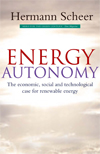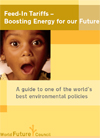PV Solar Energy Conversion is the coming “Prima donna” of Renewable Energy options. The frontrunner of New Renewable Energies is wind power. In the field of embedding Renewable Electric Power in the grids Wind Power will probably hold the first place.
However, the two unique opportunities of PV are:
- PV can be used everywhere in the world, at any place.
- PV can be applied in numerous variations, even without grids and cables.
PV is the given energy sister of the ongoing micro-electronic revolution. This micro-electronic revolution started 20 years ago to reconstruct the set up industries, of science and professions, of media and culture in general. It is a change from big and centralized to small and decentralized technologies, from inflexible and ineffective to smart and flexible systems, from individual dependencies to independence. With PV and the corresponding micro-energy storing technologies we will come from the micro-electronic age to the solar micro-electronic age, from the information-society to the solar information society. The difference between these natural sisters is: the micro-electronic opportunities are already recognized and implemented everywhere, the PV opportunities not yet.
In order to promote PV for the micro-electronic revolution and to create a proper awareness we have to reconsider: what is the state of the art of PV – technological, economical, cultural and, last but not least, political. What is the explanation for the apparent lack of concrete action in the face of research that has brought to light so many opportunities? What are adequate ways to make PV competitive and productive? How can we overcome the ongoing lack of awareness in the public and in politics, in science and industry? In the case of PV – and in general, in the case of Renewable Energies – the modern civilization is living, thinking and acting far beneath its real opportunities.
Therefore, let us look back at the last decade. In 1992 in Rio Renewable Energies were not included in the Agenda 21. The world community underestimated or ignored the opportunities of Renewable Energies. Germany, in contrast, proposed an ambitious PV promotion program: the 100.000-Roof-Program. At the European PV Conference in Montreaux, Wolfgang Palz called for a Global Photovoltaic Action Program for the non-grid connected areas in the Third World.
In 1995, WIP, EUROSOLAR and IT Power presented on behalf of the European Commission the feasibility studies “Power for the World” and “PV for Developing Countries”. In 1997, the White Paper of the EU-Commission recommended a one million PV devices program, shared equally between the EU countries and countries of the Third World. In the same year US-President Clinton announced a One-Million-Roof-Program. In 2001 the G8 task-force on Renewable Energies recommended a strategy to introduce Renewable Energies and mainly PV to one billion people up to 2010. But only two big programs really started and are running continuously: the 70.000-Roof-Program in Japan since 1994 and the 100.000-Roof-Program in Germany since 1999. However, the Johannesburg Conference may have opened a new chapter for Renewable Energies. For the first time Renewable Energies were at the center of the discussion as an indispensable solution to overcome the global environmental crisis and to satisfy the existential energy needs of the developing countries. Although the Johannesburg Conference did not come to concrete results, Renewable Energies became accepted as a top priority for global solutions. That means: Renewable Energy supporters are now facing the challenge of implementing all these hopeful prospects for PV.
The key-elements to meet this challenge are in so called developed countries: pushing the introduction of PV integration into the grids – not any more with individual subsidies plant by plant, but based on an investment security for every investor with guaranteed grid access and based on an adequate minimum prize. This is the example of the German Renewable Energy Act – with the result, that we have now more than 20% of all new PV installations annually.
- However, beside this, there is the need to push the industrial basis for PV – the mobilization of solar grade silicon in a large scale production. It will become difficult to continue the public PV promotion programs if there is a market situation in Europe in which more and more PV modules need to be imported: But a government promotion in this field requires the courage of private investors to become active. That is the homework of the industry.
- It is also necessary to give absolute political priority to research and development in the field of decentralized electric power storing technologies. Such technologies will lead to a decline in cost and the improvement of productivity. Only 20% of the expenses for conventional electric power are production costs, 80% are spent to make electric power available for everyone in grid connected systems. With decentralized storing technologies we can avoid step by step these 80% cost proportion – by overcoming the dependencies of grids and cables, and for rendering autonomous PV integrated electrical equipment more comfortable for everyone. Developer, designer in science and industry need to pay much more attention to this unique role of PV which is totally underestimated: We will get note books, mobile phones and thousands of consumer goods with integrated PV modules. Half of the overall electric power demands could be met this way.
- In the case of Third World policy for PV we have to overcome the existing financial barrier and the human capacity barrier. The proposals for financing PV are on the table, formulated by Mike Eckhart and others. The way to overcome the human capacity barrier is shown by EUROSOLAR and the World Council for Renewable Energy: a new international Governmental Organization – the IRENA is needed. Establishing this International Renewable Energy Agency will never happen by consensus, supported by each and every government and Governmental Organizations at the same time. It must be initiated by a few leading governments. The World Renewable Energy Forum in June proposed an alliance of GREEN Nations that aimed at promoting Renewable Energies faster and more actively than others. Inspired by our recommendations the German Chancellor invited – in his speech in Johannesburg – the governments to an International Governmental Conference next year in Germany – and the EU-Commission invited a kind of memo of understanding to build an alliance of leading governments. This conference could be the platform to establish a strong global network for transfer, training and financial activities with an IRENA in its center initiating and communicating the strategies.



